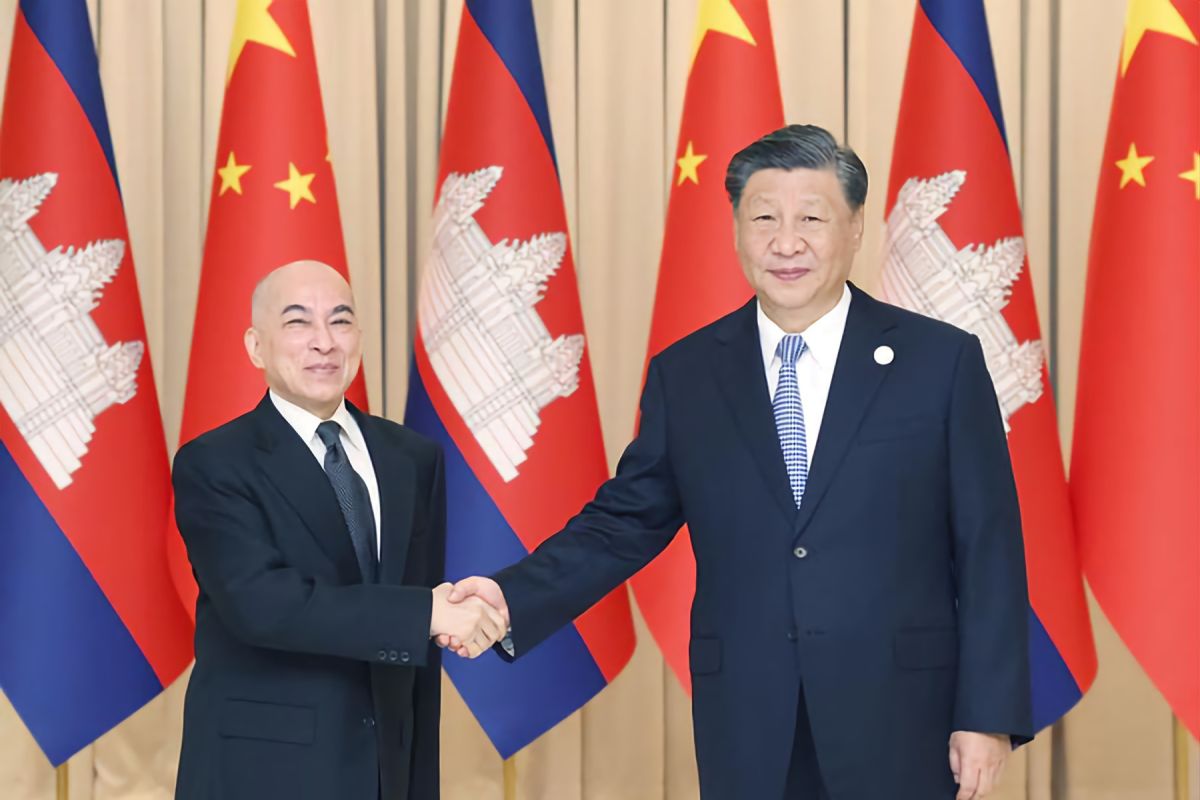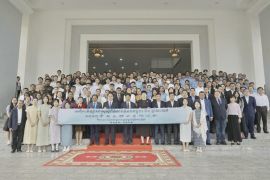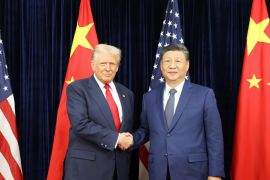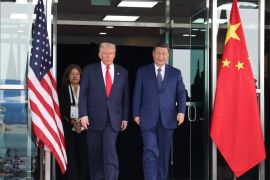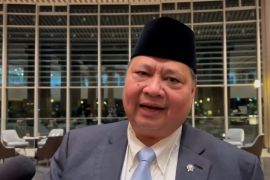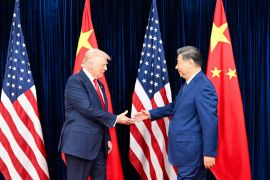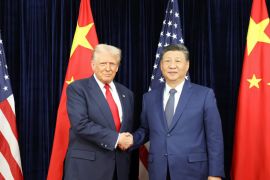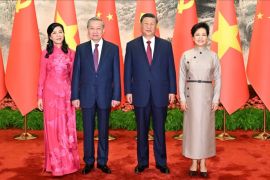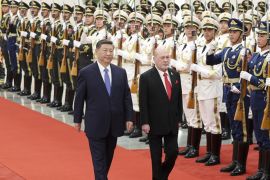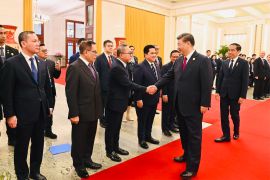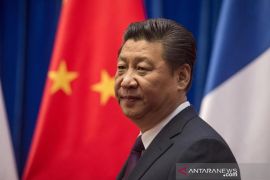Back in early 2020, Hun Sen visited Beijing during China's battle against the COVID-19 epidemic to express Cambodia's staunch support for the Chinese people at a critical moment. Three years later, Hun Sen visited China again as promised.
During their 2023 meeting, Xi recalled the prime minister's earlier visit to China amid heavy snowfall, expressing his pleasure at fulfilling this "three-year appointment" with the visiting leader.
The warm and sturdy friendship between Xi and Hun Sen serves as a faithful reflection of the close bond between China and Cambodia, carefully nurtured by generations of leaders of both sides over the decades. This relationship, described by Xi as "ironclad," will surely be renewed as the Chinese leader is set to embark on his second state visit to the Southeast Asian country.
A chair of unique friendship
On the day Xi arrived in the Cambodian capital of Phnom Penh in 2016 for a state visit, he made a special trip to the royal palace to meet Queen Mother Norodom Monineath Sihanouk. The queen mother invited Xi to sit in a chair frequently used by her late husband, King Father Norodom Sihanouk.
The Cambodian royal family had meticulously preserved this chair since the king father's passing -- covered and untouched, until Xi's visit.
"This is a privilege reserved only for the most esteemed and dearest friends," Princess Norodom Arunrasmy, who was present, stated.
With a warm smile, Xi spoke fondly of King Father Sihanouk, describing him as "a revered friend of the Chinese people and a symbol of China-Cambodia friendship." The late king father's deep personal ties with Chinese leaders since the 1950s have played a pivotal role in fostering the enduring friendship between the two countries.
More than once, Xi has quoted an old Chinese saying to underscore how the China-Cambodia friendship has withstood challenges and global transformations: "A long journey tests a horse's strength, and a long span of time reveals a person's heart."
Xi's signed article published by Cambodian media before his 2016 visit to the country noted that China will never forget Cambodia's role as one of the first nations to recognize the People's Republic of China and a champion of China's rightful seat at the United Nations.
The friendship between the two close neighbors has always been mutual. China has been a steadfast partner of Cambodia, supporting its national independence and economic development, including the construction of Cambodia's first cement plant and thermal power station.
To honor the friendship, Xi awarded a Friendship Medal to the queen mother at the Great Hall of the People in Beijing in November 2020. "This weighty 'Friendship Medal' represents the deep respect of the Chinese people for Queen Mother Monineath and the profound friendship between China and Cambodia," he affirmed.
Xi has also shown particular care for Cambodia's royal family. "Beijing is your home. You're more than welcome to return whenever you like," he stated while meeting King Sihamoni and Queen Mother Monineath at Beijing's Diaoyutai State Guesthouse in 2014. He also made thoughtful arrangements for their medical check-ups in China. Over the past decade and more, King Sihamoni and Queen Mother Monineath have regularly visited China, almost twice annually.
Xi has also maintained frequent exchanges with Hun Sen over the years. With Hun Manet assuming office as Cambodia's prime minister, this close friendship has been passed on to the next generation.
In September 2023, Hun Manet selected China as his first official overseas destination after taking office, reflecting Cambodia's diplomatic priority. During his meeting with Xi, Hun Manet pledged to further strengthen the ironclad friendship between Cambodia and China.
Ek Sam Ol, president of the Cambodia-China Friendship Association, remarked that the relationship between China and Cambodia has not only set an example for large and small countries to get along with mutual respect, equality, and win-win cooperation but also contributed to regional peace and stability, which has brought great benefits to the people of the two countries.
A road to hope
A Cambodian proverb says, "Where there is a road, there is hope." In May 2024, the Royal Government of Cambodia named a road in Phnom Penh "Xi Jinping Boulevard" to honor the Chinese leader's historic contributions to the country's development.
In 1965, the late King Father Sihanouk similarly named a road after Chairman Mao Zedong.
At the naming ceremony, Hun Manet highlighted that bilateral ties have entered their best period in history under the leadership and joint efforts of Xi and Cambodian leaders.
Since 2013, the China-Cambodia comprehensive strategic cooperative partnership has continued to strengthen, driven by flourishing practical cooperation across various fields. Xi's proposed Belt and Road Initiative (BRI) has played a significant role in fostering common development and shared benefits for both sides.
Cambodia, located along the ancient Maritime Silk Road, was among the first countries to join the Belt and Road cooperation. Its leaders have participated in all three editions of the Belt and Road Forum for International Cooperation held in China in recent years.
Over the years, key BRI projects in Cambodia have reaped fruitful results. The Sihanoukville Special Economy Zone (SSEZ) has attracted over 200 international enterprises and institutions, generating 32 thousand jobs. Cambodia's first expressway, the Phnom Penh-Sihanoukville Expressway, has reduced travel time between the two cities from over five hours to less than two. Additionally, the Siem Reap Angkor International Airport has helped Cambodia's tourism take off, operating 17 routes by the end of last year.
"The SSEZ, along with other flagship BRI projects, has played a crucial role in helping Cambodia achieve its ambitious targets of becoming an upper-middle-income country by 2030 and a high-income nation by 2050," Neak Chandarith, director of the Cambodia 21st Century Maritime Silk Road Research Center, remarked.
Bilateral trade and commerce have also thrived. China has been Cambodia's largest foreign investor and trading partner for several consecutive years. Official data indicates that bilateral trade has nearly quadrupled over the past decade. The Cambodia-China Free Trade Agreement and the Regional Comprehensive Economic Partnership have facilitated the exports of Cambodian products like rice, bananas, longans, and Basa fish to Chinese markets.
Xi has consistently advocated for a comprehensive approach to China-Cambodia cooperation, as reflected in his repeated emphasis on the importance of the bilateral "Diamond Hexagon" cooperation framework, which covers six major areas: politics, production capacity, agriculture, energy, security, and people-to-people exchanges.
These efforts have provided new impetus for building a high-quality, high-level, and high-standard Cambodia-China community with a shared future in the new era, a vision pledged by both nations' leaders, Thong Mengdavid, a lecturer at the Institute for International Studies and Public Policy at the Royal University of Phnom Penh, noted.
Sharing valuable insights
In April 2017, the Khmer edition of the first volume of Xi Jinping: The Governance of China was released in Cambodia, with Hun Sen attending the launch ceremony.
First published in 2014, this 18-chapter book compiles 79 speeches, talks, addresses, interviews, instructions, and congratulatory messages by Xi from November 2012 to June 2014. The book series, now comprising four volumes, serves as a key resource for readers worldwide to understand Xi's philosophies in running a major country like China.
Addressing an audience of over 700 attendees, Hun Sen expressed hope that Cambodian officials, scholars, and students would gain valuable insights from the book and apply them to Cambodia's unique conditions, thereby contributing to more effective governance.
Chea Munyrith, president of the Cambodian Chinese Evolution Researcher Association, led the translation team. In his view, Cambodia's recent development is closely tied to learning from China's experiences and ideas, many of which are reflected in Xi's book.
One article in the book focuses on poverty alleviation and wealth creation in impoverished areas. Under Xi's leadership, China eradicated absolute poverty in 2020. This achievement enabled China to meet the poverty eradication target in the United Nations 2030 Agenda for Sustainable Development a decade ahead of schedule.
"Cambodian officials particularly focus on poverty alleviation and closely follow China's governance experience in this area," Munyrith stated.
In recent years, poverty reduction cooperation between the two countries has made concrete progress, highlighted by the establishment of poverty alleviation demonstration villages. The Chinese side has shared useful experiences in integrating modern agriculture, vocational training, and rural development with its Cambodian counterparts.
As a result of those efforts, concrete roads, canals, solar-powered lamps, and clean water facilities have been built in villages. According to the UNDP Country Programme Document 2024-2028 released last year, Cambodia has lifted 2.8 million people, or 50 percent of the country's total poor, out of poverty over the past seven and a half years.
Xi has consistently supported Cambodia in pursuing a development path tailored to its unique national conditions. This principle has been central to China's accomplishment of twin miracles: rapid economic growth and enduring social stability.
With his repeated proposal, China and Cambodia are deepening cooperation in aligning the BRI with Cambodia's "Pentagonal Strategy" for national development.
In Hun Sen's eyes, Xi is a great leader and a remarkable person capable of guiding China's development.
"Every initiative he has proposed, such as the Belt and Road Initiative, which bridges past and present, and the Global Development Initiative and Global Security Initiative, reflects his far-reaching vision," Hun Sen stated.
Related news: Prabowo, Xi discuss blue economy, infrastructure: Hartarto
Related news: Indonesia's Prabowo lands in Beijing for first state visit
Editor: Azis Kurmala
Copyright © ANTARA 2025
